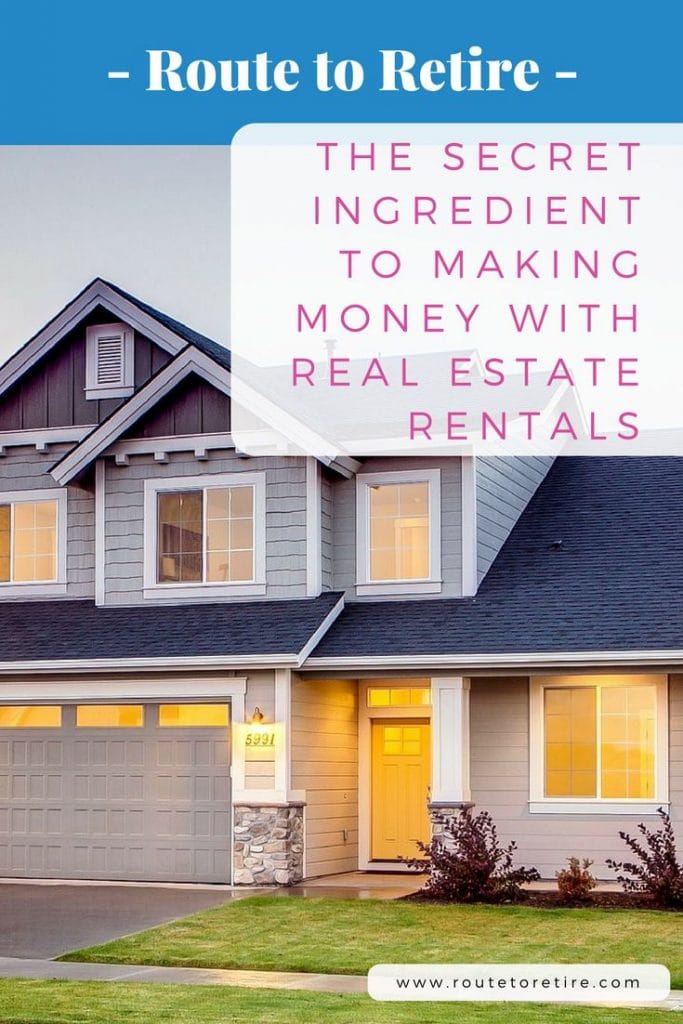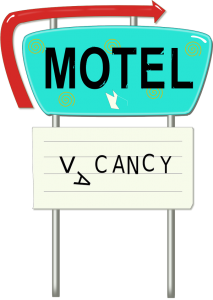 Let’s be honest, the idea of making money with real estate is intriguing. Even if you haven’t gotten into the real estate game, you likely know or have heard that rental properties can be a great investment.
Let’s be honest, the idea of making money with real estate is intriguing. Even if you haven’t gotten into the real estate game, you likely know or have heard that rental properties can be a great investment.
There are some great advantages to owning rental property, but is there really a secret ingredient to making money with real estate rentals?
There’s definitely an essential secret sauce, but here’s the deal – it’s not really that much of a secret. In fact, you’ve probably heard it before…
You make your money when you buy your rental property.
And by that I mean, if your end game is to be making money with real estate rentals, your calculations need to be correct out of the chute or you’re probably going to have some cash flow problems.
I have a single-family rental and a duplex and I’m currently looking for another duplex. My agent, who I like and have used a couple times already, is helping me find my next property.
I like him because he’s always straight-up with me and won’t let me buy crappy houses. We’re on the same level and he knows what kind of property I’m looking for.
But while we were out touring a duplex recently, he said something that irked me a little…
Jim, the numbers look good on this one… after your mortgage payment, taxes, and insurance, you’ll make about $500 per month on this one.
Sounds easy enough, right? So, why the heck would that bother me?
The problem with that statement is that it’s only taking into consideration the obvious costs. But there are other expenses that you need to factor in when buying if you want to stand a good chance of making money with rentals.
When I bought my first rental property years ago, I didn’t realize that. In fact, like many people, the statement my agent made would have been right in line with my thinking back then. And that’s a possible recipe for disaster.
You’ll likely have some one-time costs to get the property where it needs to be to rent out (assuming it’s not a turnkey property), but what about your recurring costs to plan for? Here are some other expenses to take into consideration when doing your math for a property…
Repairs/Maintenance

Obviously, there will be the ongoing repairs and maintenance that come with a rental property. Additionally, if the property is older, the frequency and cost of the repairs will probably be more.
The rental house I have was built in 1917 (hey, I guess it’s now a century home!). Being so old though, this makes my house a lot more prone to repairs than my duplex, which was built in 1967. And both of these properties will be more likely to have frequent repairs than say a ten-year-old home.
On top of that, nothing is standard in the older homes, so repairs tend to be more expensive and always seem to reveal even greater more repairs that then need to be fixed… tons of fun! 🙂
Depending on where you live and the type of properties you’re looking at, this number can vary across the gamut. I usually figure that 10% of my gross income will go to ongoing repairs.
Capital Expenditures (CapEx)

Capital expenditures (CapEx) are the long-term expenses that can really hurt your cash flow if you don’t plan correctly. Some of these fun examples include:
- Replacing the roof
- Putting in a new furnace or A/C unit
- Replacing the hot water heater
- Fixing the driveway/sidewalk
The key to these expenses is two-fold. Make sure that you have some money out-of-the-gate to handle these types of expenses in case they happen sooner than later. And then start putting money away immediately with each rental check to start saving for these big costs.
Like all the other expenses, this number can vary, but a good number to use might be 10% of your gross income.
Vacancies

Boy, wouldn’t it be nice if you had tenants in your properties at all times?! Unfortunately, it doesn’t work that way, so you need to account for that from the beginning.
The amount of vacancy to factor in is going to be reliant on the rental demand in the market and the area the property is located in. You can get somewhat of a better feel for what kind of vacancy rate to expect by looking at info from the U.S. Census Bureau.
For my properties, I figure in about an 8% vacancy rate. I’ve been lucky so far and haven’t had much turnover, but that can always turn on a dime.
As a side note, when you have a single-family house and the tenant leaves, you have no rental income coming in. An advantage of multifamily properties is that when a tenant leaves, hopefully, you still have at least one other tenant in there. Moreover, the other tenant(s) might produce enough income to help cover some or all of the mortgage payment you might have to make on the property.
Property Management

For residential property, property management companies tend to charge between 8 and 12 percent of rent every month. This is in addition to other fees that they may have – mine, for instance, charges the first month’s rent when they have to bring in a new tenant. Yeah, I know, it might be time to start shopping for a new company.
But, Jim – I plan to manage all the properties myself, so this expense isn’t relevant to me.
Maybe not right now it’s not. However, let’s say that after a year, either you hate managing it or you’re unable to for some reason. Or, down the line, maybe you start buying more properties and decide that you need some help.
If you didn’t consider this when buying your rental property, you could now be looking at an expense that puts you underwater every month… not fun.
Give yourself the flexibility to be able to off-load this later. If you don’t end up using a property management company, your only complaint would be that you’re adding extra money to your bottom line instead and who wouldn’t want that?!
Now we know some of the expenses that have to be taken into consideration when evaluating rental properties, so what’s next? Time to crunch some numbers…
Running the Calculations
When evaluating properties, you can do these calculations manually to determine your expected cash flow or you look at using a calculator like the Rental Property Calculator offered by BiggerPockets.
They let you try it out for free, but if you’re searching for a property, you’ll probably need it a lot more and would need to spring for a paid membership. The good news is that the cost should pay for itself pretty quickly if it gets you a solid cash-flowing property.
Really, the math should be the starting factor for most deals and is straightforward enough. Your objective it to determine your income you’ll get from this property and subtract out your anticipated expenses I’ve mentioned and, of course, your mortgage payment.
If the resulting number is positive and maybe a minimum of one to two hundred dollars per unit, it’s worth checking into further. If it’s not, it might not be worth your time or you might need to get a better deal on it.
One last thing…
The 50% Rule

When we’re talking specifically about multifamily properties, a good rule of thumb for factoring in the cost of repairs is to use the 50% rule. The idea behind this is that you should figure that the cost of expenses will be 50% of your income… and that doesn’t include the mortgage.
Holy crap, Jim – that’s a lot of money!!
It is, but it’s also simply a rule of thumb. It’s a quick calculation to help you evaluate properties at a glance to lessen the chance of losing money every month on a dud property.
When trying to rule out multifamily properties that won’t cash flow well, you can use the 50% rule as a quick check to determine if it’s worth investigating further.
Here’s how it works. Let’s say you find a duplex that’s $125,000 and one side is renting for $750/month and the other side for $800/month…
- Determine the total amount of income you’ll have coming in every month from the property (rent, laundry, storage, etc.). In this example, it would just be the rents, totaling $1,550 per month.
- Assume that half (50%) of that will go out the window toward expenses (ongoing repairs, taxes, insurance, vacancy, etc.). That leaves us with $775.
- Use an online mortgage calculator to determine the monthly mortgage payment. For our simple example, let’s say we put down 20% and the monthly mortgage payment comes out to be $500/month. We take our $775 and subtract out this $500 and what remains is $275 in cash flow.
Without much effort, we now have a quick gauge telling us that this property may cash flow about $275 per month. Nothing’s in stone, but this one might be worth digging into further. If the result was much less or even negative, you would probably want to pass and move onto the next property.
Making Money with Real Estate Rentals
As you can see, the secret ingredient to making money with real estate rentals is to make sure your numbers make sense when you buy and not later on down the road.
Going back to the story of my first rental property, I ended up getting lucky. I’ve had the same tenants in there from the beginning (around 8 years) and I’ve slowly been increasing the rent along the way. I also haven’t had any major problems with the place.
For a long time, I was probably breaking even when all was said and done. Now, however, it’s starting to cash flow a little better (not much). The house will be paid off in about 7 years and then it’ll become a solid cash flow machine.
But that’s been all luck and my duplex has picked up some of the slack in the meantime. I don’t want to take another chance on my third rental property, so you can bet your bottom dollar I’ll be factoring in ALL the expenses when I’m ready to make an offer.
So, my advice to you… plan from the beginning. You’ll be glad you did and your chances of success will be much greater.
Is making money with real estate rentals something that’s been on your agenda?
Thanks for reading!!
— Jim

Great post, especially agree on the maintenance and property management side of things. It’s essential to have your calculations setup correctly before you buy a property. It can make or break you financially.
Think that the maintenance side of things is often heavily underestimated by many new RE investors, but also by home owners! These large CapEx items can really hurt.
Guess you also keep a portion of your cash-flow aside and have a maintenance plan in place for your properties? I know we have 🙂
Hi CF! Similar to you, we keep some of our cash flow separate for repairs. A year or so ago, we moved everything over to an LLC and created a separate business account for them. Everything now flows into and out of that account and we leave a portion of it in there to build for repairs and CapEx.
— Jim
Thanks for the thoughtful analysis, Jim. Owning a rental property is a consideration for me, but honestly a frightening one. I watched several family members who over extended themselves with rental properties lose most of them in the sub prime mortgage era. As a cop, I see only the evil tenants and have a biased exposure to the market.
I know it’s not an accurate portrait of what most people experience, but seeing what could happen in a worst case scenario on a weekly basis definitely gives me pause, especially in tenant friendly California!
Hey Jack! I can definitely see how you might get a biased view of the housing market serving and protecting. On the flip-side though, what’s to stop the stock market from collapsing? At least with rental property you have some control over things – you might still get that bad tenant, but I would hope that wouldn’t be the norm.
— Jim
Hi Jim great post I’m in the process of buying my first rental and I have to admit I didn’t include an expense item for Property Mgt. Basically, I used 1% of house value for annual repairs, cashflow had to break even at 70% occupancy and had to have a cap rate greater than 6%. I wrote a post on the process I used. If you have a chance to check it out I would love feedback from someone like yourself whos got more experience in the rental market.
Cheers.
FI3000
Hi FI3000 – that’s fantastic that you’re getting your first rental! I’m still learning the process as we continue to buy, but I’d highly recommend using a calculator (like the one on BiggerPockets) with some fictitious numbers. That gives some greater flexibility to determine what the numbers need to be to give you a strong enough cash flow.
I’m not sure about basing the percentage of repairs on the value of the house since that doesn’t have much to do with what repairs will be – that’s more what the market says the house is worth, which is kind of an arbitrary number.
Best of luck on your new property!!! 🙂
— Jim
Jim, lots of wisdom in this post! If every investor knew these costs you mention, they would offer a lot less for properties. Perhaps I see some reasoning in agents not “realizing” those costs when talking to buyers:)
Thanks for sharing. And good luck with your next purchases!
Hi, Chad – always appreciate hearing from the real estate estate guru!! 🙂
Good point about agents happening to leave out those costs… in their best interest to make the sale.
Thanks for stopping by!
— Jim
Thanks for the compliment, Jim. I don’t know if I’d consider myself a guru though. Maybe it’s the bad taste I’ve had in my mouth seeing so many of the late-night infomercial types of real estate gurus. Lol. They show all the good stuff and no scars! We all know there is good and bad, which I why I like blogging articles and info like yours much better.
Keep up the great work, and I look forward to exchanging ideas!
Touché – guru was a poor choice of words… how about real estate guiding light? 🙂
— Jim
Awesome post Jim! I always run the numbers on buying rentals, but it always works out so terrible in our area. I don’t know why people do it.
In most cases, it’s better for me to put money into the S&P instead. I still think about investing in rentals all the time, but you’re right — the math has to make sense first.
Thanks, Mr. Tako – just out of curiosity, have you ever considered investing in rentals in another area of the country?
— Jim
I’ve thought about it but never decided to. And the way property tax is going, I don’t think real estate is a good long term idea. Where I live, the government is increasing property taxes on all foreigners. And if you have more than 1 house that you don’t rent or live in for more than 6 months, the government taxes you again.
When the government runs out of money, the first thing they do is attack foreigners on real estate (this is happening in Vancouver and Toronto too).
That’s interesting, Troy – are you talking about investing in the U.S. and what country do you reside in?
— Jim
This reads like a Grant Cardone show. Have you ever thought of doing a podcast? Nice article Jim!
Very much appreciated! No podcasts from me… I like the idea, but no time right now. Maybe I’ll look into the idea a few years from now once I hit FI.
— Jim
Thanks for sharing the realities behind rental analysis for everyone, Jim. It kills me when agents give investors and would be investors bad information on cash flow because they simply don’t get it themselves. Oh, and I appreciate you sharing BiggerPockets as well!
Thanks, Josh – it’s tough because I actually really like this agent and have been working with him for years. He actually has good intentions and thinks he’s giving good information. That’s why investors really want to have a good understanding themselves before jumping into property buying… and obviously that’s an area where BiggerPockets shines!
— Jim